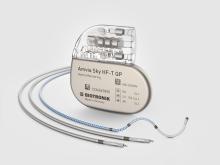MRI scans and cardiac devices: What’s the issue?
A special case of medical examinations are Magnetic Resonance Imaging (MRI) scans. They are among the most important examination procedures nowadays. Due to their strong magnetic fields, however, you and your cardiologist will need to take extra precautions. Read more about cardiac devices and MRI scans here.


